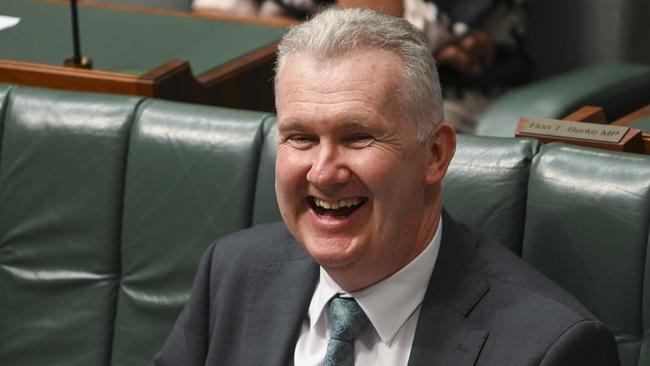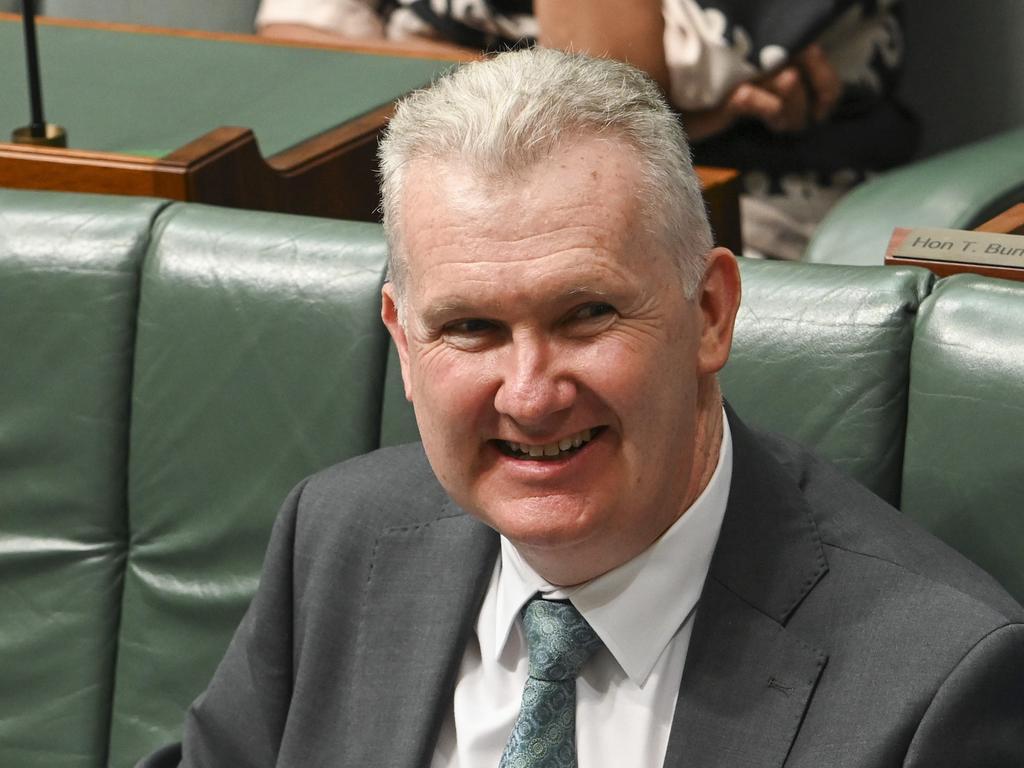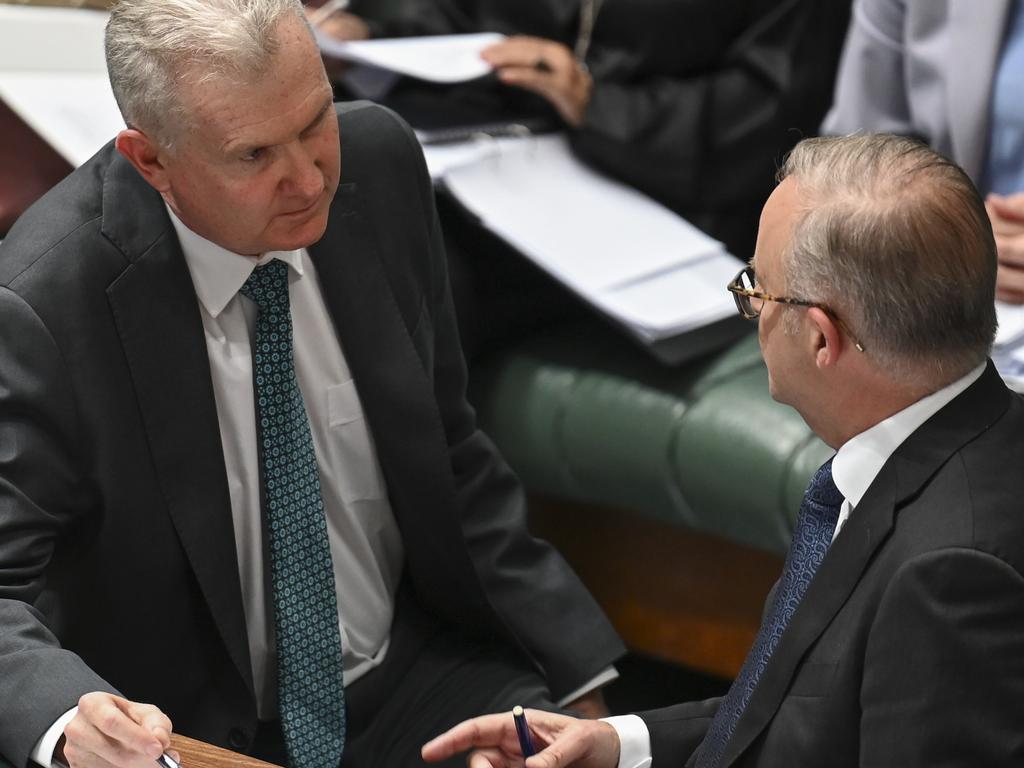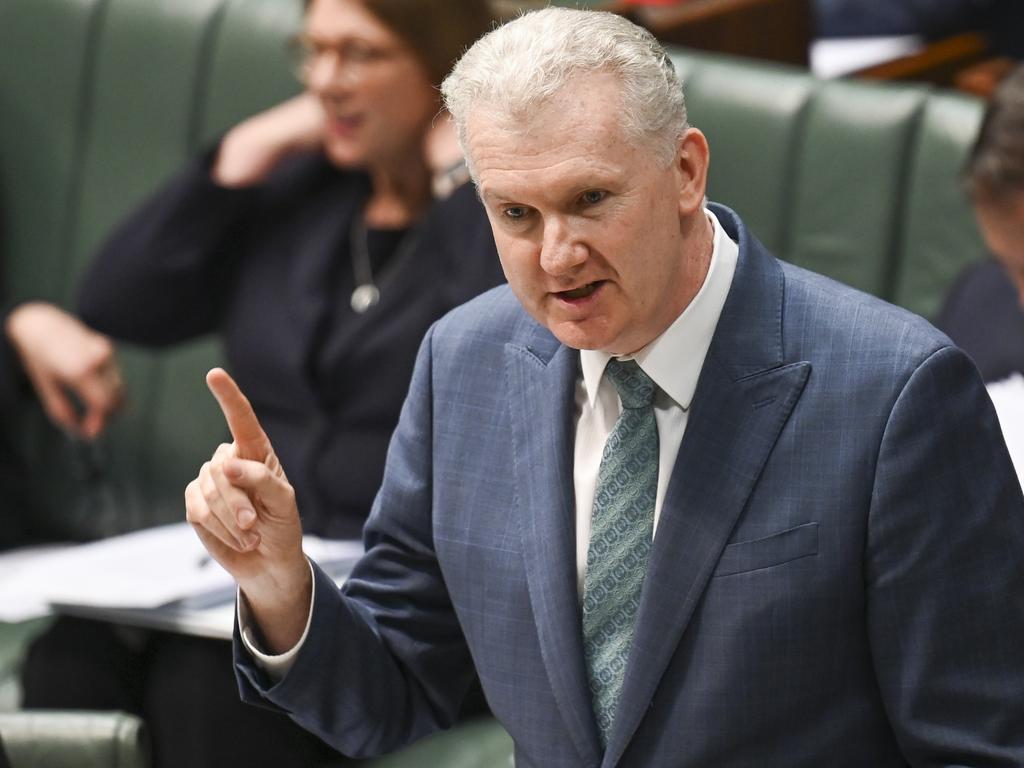Tony Burke award: ALP wins on industrial relations but cost is to come
Employers have warned that Labor’s sweeping workplace reforms will fail to create a single job, will increase red tape and will undermine productivity.

Employers have warned that sweeping workplace reforms to deliver greater rights for casuals to convert to permanent employees, minimum standards for gig workers and the ability for workers to ignore their boss after hours will fail to create a single job, will increase red tape and will undermine productivity.
Following hours of confidential negotiations with Workplace Relations Minister Tony Burke, ACT senator David Pocock announced he would deliver Labor the vote needed to pass the changes after the government agreed to a series of amendments, including the ability of employers to refuse casual conversion on reasonable business grounds.
Mr Burke’s parliamentary victory is a significant moment in Labor’s reshaping of the industrial relations landscape, with three tranches of workplace reforms now set to be law and ascendent trade unions achieving major pay rises in the past year in the public sector, construction sites and the nation’s second-largest stevedore.
Senator Pocock said the changes the crossbench had negotiated made the workplace reform bill much simpler and fairer, preserving choice and flexibility.
Mr Burke said the new laws would give casual workers a clearer pathway to permanent work, while gig workers and truckies would finally benefit from minimum standards. “Last year we changed the law to criminalise wage theft and stop the underpayment of workers through the use of labour hire. Now we’re poised to close more of the workplace loopholes that have been undermining wages and worker safety,” he said.
The passage of the government’s new tranche of industrial relations reforms will mark the end to a successful first week in parliament for Anthony Albanese and Labor, after it assured the passage of its revamped stage three tax cuts package.
But Business Council of Australia chief executive Bran Black said employers were opposed to the bill as a whole “because it adds complexity, costs and red tape at the worst possible time, making it harder to do business”.
Australian Industry Group chief executive Innes Willox said “not a single additional job” would be created by the changes.
“They will not make workplaces more harmonious, give workers more job security, sustainably put extra money in workers’ pockets, make businesses more secure and productive or in any way support workplace innovation or skills development,” Mr Willox said. “Instead, they will undermine these objectives.”
Under the changes, workers will be able to take their employer to the Fair Work Commission to stop them unreasonably contacting them after hours, with bosses facing potential fines if they persist. But through amendments secured by Senator Pocock and welcomed by business, the reform will be delayed by 18 months for small businesses.
In other amendments, the casual provisions will not start until six months after they are legislated, while a worker’s employment contract will be able to be considered by the Fair Work Commission in determining whether an employee is casual or not. Employers will also be able to refuse an employee request for conversion to permanent status on fair and reasonable operational grounds.
ACTU secretary Sally McManus said the news that workplace loopholes would be closed would be “music to the ears of casuals, gig workers and truckies”.
“Finally, we have a government who is stepping up and tackling the cost-of-living crisis by making work a more secure and safer place to be,” Ms McManus said. “Casual workers will now have a simpler route to covert to permanent if they so wish, while gig workers and truckies will now have minimum standards to fall back on. This is what governments are elected to do, make real positive change to Australia.”
Australian Chamber of Commerce chief executive Andrew McKellar has called the proposed right to disconnect IR laws “a dumb idea”.
“It’s a thought bubble that’s come from the Greens and honestly it looks to us like an attempt to legislate for something that should be common sense,” Mr McKellar told Sky News. “Of course, we are concerned that if it leads to a situation where there’s a risk for more litigation … in an environment where we should be working more flexibly. Let’s not try to regulate for something that honestly should be able to be worked out practically between bosses and their employees.”
Council of Small Business Organisations Australia chief executive Luke Achterstraat welcomed amendments that he said reduced uncertainty around the new definition of casuals.
Harvey Norman Holdings executive chairman Gerry Harvey said he could not see the logic of the IR changes. Taking aim at the push to make it easier for casual workers to become permanent, he said Australia was at or near full employment.
“We don’t have an unemployment problem and businesses are looking for people but they can’t find them,” Mr Harvey said. “I don’t know why it’s an issue. I don’t get it. I think if you’re a business you should be able to employ permanent people and you should be able to employ casual people. But I don’t see how you can make a ruling that because you employed a casual person that after a certain period of time they have to become permanent. You may not have a position for them.”
Flight Centre chief executive Graham Turner described the reforms as overkill. “I can’t see why people can’t disconnect if they want to anyway,” Mr Turner said. “All they have to do is switch your phone off or switch your laptop off. It’s overkill from what I see. I can’t see the rationale behind this … My gut feeling is that it’s a total over-reaction on something that’s not an issue.”
Announcing his support for the bill on Wednesday night, Senator Pocock said he had negotiated “significant amendments on key issues ranging from casuals, to regulation of the gig economy to the Greens’ proposal for a right to disconnect”. “If you want to remain a casual you can, but if you want to convert to permanent there is now a better process for doing so while still preserving a business’s right to refuse on fair and reasonable grounds,” Senator Pocock said.
“As a result of our changes, existing independent contractors can now elect to keep their arrangement unchanged.
“Gig workers will have the benefit of new minimum standards but there will also be guardrails in place so that platforms can continue to operate and innovate with a fairer way of testing who is employee-like and who isn’t.”
Under the gig worker amendments, the Fair Work Commission will be limited to considering the class or classes of regulated businesses to be covered by proposed minimum standards orders or guidelines, rather than naming individual businesses. The number of criteria a worker will need to be defined as employee-like will be increased from one to two.
In early opposition to the bill, some companies warned prices could go up for consumers if the gig economy reforms passed. Food delivery giant Uber claimed in a submission to the Senate last October that food delivery costs could rise as high as 85 per cent if gig worker rights changed.
Additional reporting: Chris Herde








To join the conversation, please log in. Don't have an account? Register
Join the conversation, you are commenting as Logout